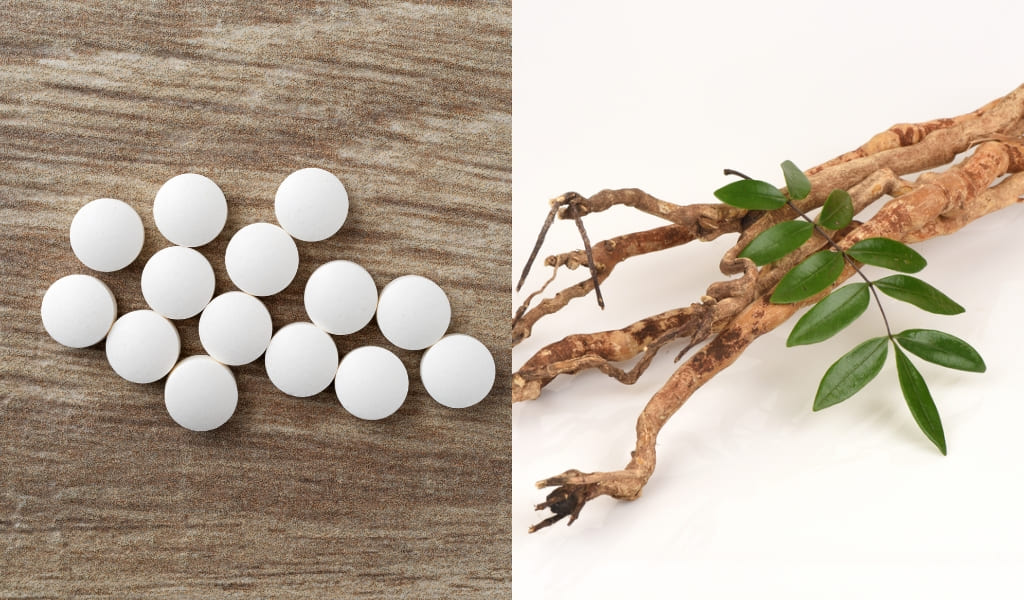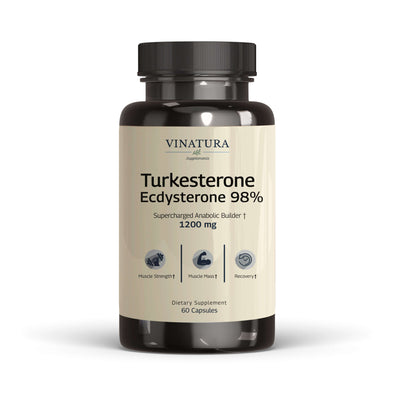
Is Combining DHEA And Tongkat Ali Together A Good Idea?
Combining DHEA and Tongkat Ali is a popular trend, yet its efficacy and safety remain debated.
DHEA, a hormone precursor, and Tongkat Ali, an herbal supplement, both purportedly enhance vitality and hormonal balance.
However, caution is advised due to potential interactions and individual health variations.
Therefore, in this article, we will find the answer to the question, "Is Combining DHEA And Tongkat Ali Together A Good Idea?".
Before exploring further, please read the disclaimer located at the end of this webpage.
Key Takeaways
- There isn't much-recognized research on the safety and effectiveness of combining Tongkat Ali and DHEA.
- Combining Tongkat Ali and DHEA should be consulted with a doctor or healthcare professional.
- While Tongkat Ali supports healthy natural testosterone increase, improving sexual health and performance, DHEA is known for its metabolic regulation, hormone balance, and immune response strengths.
What Is DHEA and Its Role On the Human Body
DHEA, or dehydroepiandrosterone, is a natural hormone the adrenal glands synthesize. It acts as a precursor to both male and female sex hormones, such as testosterone and estrogen.
DHEA plays a pivotal role in numerous physiological functions, encompassing the regulation of metabolism, immune response, and energy levels.
As individuals age, DHEA levels naturally decline, prompting consideration of supplementation for potential benefits associated with aging and overall well-being.

Is Combining DHEA And Tongkat Ali Together A Good Idea?
The idea of combining DHEA and Tongkat Ali is driven by their individual attributes, which complement each other.
Tongkat Ali boosts natural testosterone, enhancing male vitality, energy, and vigor, reduces stress, boosts immunity, and improves physical performance.
Several users on Amazon who have taken supplements containing Tongkat Ali have reported noticeable changes in their bodies. One user, Ari Givony, shared that he feels the product enhances his sense of well-being and significantly boosts his overall energy levels.*
DHEA balances hormones, supports mood, reduces cardiovascular risks, and aids brain health.
While both have individual benefits, their combined effect is not extensively studied. Consult a healthcare professional before starting any new supplement regimen.
Also read: Shilajit Vs Tongkat Ali - Difference vs Surprised Combination
How To Take DHEA And Tongkat Ali?
When using DHEA and Tongkat Ali, choosing reputable suppliers is important to avoid consuming unregulated supplements that might negatively impact your health.
Besides, DHEA is a hormone that cannot be directly self-supplemented and must be obtained through dietary supplements. To consume both DHEA and Tongkat Ali simultaneously, it is recommended to use a supplement that contains both of these substances.
DHEA
DHEA comes in various forms, such as topical creams, tablets, and capsules. Depending on your goals or health needs, you may use it in a specific form.
For instance, if you wish to improve facial skin conditions or combat aging, using DHEA as a skin cream may yield better results.
The time for DHEA to take effect is typically around 6 to 8 months, depending on individual absorption capability and usage method.
Consulting healthcare experts helps determine the suitable dosage according to individual needs and health conditions.
The recommended time for DHEA usage is in the morning to align with the body's hormone production cycle. It's crucial to regularly monitor hormone levels to prevent excessive elevation while using DHEA.
Tongkat Ali
Tongkat Ali can be processed into various forms, and each form has its distinct usage method. Below are different ways to take Tongkat ali you can consider:
- Tablet form: Primarily found in Western medicine and dietary supplements.
- Capsule Form: Certain supplement brands provide Tongkat Ali in capsule form for a convenient and flexible intake. Users can swallow it with water or split the capsule, diluting its content with filtered water, juice, or coffee.
- Powder form: Dried roots are ground into powder and dissolved in warm water.
- Decoction: Dried core roots are cut into small pieces and then boiled until condensed to a certain level, consumed similarly to tea.
- Paste form: The roots are sliced into small pieces, ground into powder, mixed with honey, and heated at 55°C. After cooling, the paste is stored in cool temperatures for gradual use.
- Soaked in honey wax: The core is soaked in honey wax for 3 to 4 days, ready for use once infused.
- Soaked in alcohol: The dried core roots are soaked in alcohol, a standard preparation method, for a minimum of 1 month.
However, it's crucial to pay attention to the recommended dosage and adhere to healthcare expert guidelines.
You may also like: Tongkat Ali vs Turkesterone: Which's Better & Can They Combine
The Dosage Of DHEA And Tongkat Ali
Scientific evaluations confirm that Tongkat Ali is safe for daily consumption. The recommended daily intake generally ranges from 200 to 400 mg to effectively provide Tongkat ali benefits.
A 2012 study involving 109 men aged 30 to 55 found that taking 300 mg of Tongkat Ali extract daily for 12 weeks was as safe as taking a placebo.
While research indicates the safety and tolerance of the following doses:
- DHEA orally administered: A daily intake of 30 to 50 mg [2]
- Intrarosa (prasterone): Topical application of 0.25% to 1% once daily for 12 weeks [3].
When considering their combination, lowering the dosage becomes crucial to harness their potential benefits effectively.
Fortunately, their interaction doesn't pose concerns, allowing their concurrent usage without reaction, especially if they are not using other medications.
However, consulting a healthcare professional is advisable beforehand if other medications are involved.
Frequently Asked Questions
Does Tongkat Ali Boost DHEA Levels?
A 2021 study confirmed Tongkat Ali's link to increased healthy testosterone levels through heightened hormone production via the hypothalamic-pituitary-adrenal axis[4]. Additionally, a separate trial with 105 men aged 50-70 noted elevated Dehydroepiandrosterone (DHEA) levels following a 12-week, 200mg daily Tongkat Ali root extract intake [5].
What Should You Avoid Taking With DHEA?
If you're presently on tamoxifen, avoiding DHEA intake is recommended due to potential interactions. Moreover, DHEA might interact with triazolam (Halcion), affecting its breakdown process in the body.
Are There Any Substances Or Medications That Should Not Be Combined With Tongkat Ali?
There's a potential interaction between Tongkat Ali and medications that lower blood sugar levels, like glipizide, metformin, and miglitol. Additionally, it might reduce the bioavailability of propranolol, a drug used for managing high blood pressure and heart health.
Conclusion
In conclusion, DHEA and Tongkat Ali have distinct health benefits, with the potential to complement each other when combined. However, their interaction hasn't been extensively studied. Consider the recommended dosage and consult with healthcare professionals before starting any supplement regimen. It's crucial when other medications are involved to ensure a safe and effective health journey.
Related Articles:
- Best Tongkat Ali Supplements 2024: Forms & Price And Origin
- Should You Take Tongkat Ali On An Empty Stomach Or With Food?
- Should You Take Tongkat Ali Before Or After A Workout?
- Can I Take Pregnenolone and DHEA Together?
References
- [1] Ismail, S. B., Wan Mohammad, W. M. Z., George, A., Nik Hussain, N. H., Musthapa Kamal, Z. M., & Liske, E. (2012). Randomized Clinical Trial on the Use of PHYSTA Freeze-Dried Water Extract of Eurycoma longifolia for the Improvement of Quality of Life and Sexual Well-Being in Men. Evidence-Based Complementary and Alternative Medicine, 2012, e429268. https://doi.org/10.1155/2012/429268
- [2] DHEA: MedlinePlus Supplements. (2019, December). Medlineplus.gov. https://medlineplus.gov/druginfo/natural/331.html
- [3] U,S. Food and Drug Administration. Intrarosa (prasterone) vaginal inserts.
- [4] Chan, K. Q., Stewart, C., Chester, N., Hamzah, S. H., & Yusof, A. (2021). The effect of Eurycoma Longifolia on the regulation of reproductive hormones in young males. Andrologia, 53(4). https://doi.org/10.1111/and.14001
- [5] Chinnappan, S. M., George, A., Pandey, P., Narke, G., & Choudhary, Y. K. (2021). Effect of Eurycoma longifolia standardised aqueous root extract–Physta® on testosterone levels and quality of life in ageing male subjects: a randomised, double-blind, placebo-controlled multicentre study. Food & Nutrition Research, 65. https://doi.org/10.29219/fnr.v65.5647
Testimonial Disclaimer
*The testimonials presented on this website are provided by individuals based on their personal experiences with our products. These testimonials represent individual opinions and experiences, which may not be typical or applicable to all users of our products. Results may vary depending on a variety of factors, including individual health, lifestyle, and adherence to product usage instructions.Author

Product Disclaimer
Including an ingredient or study does not evaluate, endorse, or recommend any Vinatura product or any third-party product. Some ingredients discussed may not be used in any Vinatura product.
The content of the articles has not been evaluated by the Food and Drug Administration (FDA) and is not intended to promote or endorse any specific product. Any products sold on this website are not intended to diagnose, treat, cure, or prevent any disease.
Opinions and Endorsements
Any claims, statements, or opinions expressed in the articles are those of the author(s) and do not necessarily reflect the views or opinions of the manufacturers of the dietary supplement products. The products sold on this website are separate from the content of the articles and are not directly endorsed or associated with the information presented here.
Liability Disclaimer
The author(s) of the articles, website, and manufacturers of the dietary supplement products do not assume any liability for any potential consequences arising from the use of the information provided in the articles. Ingredient effects, dosages, and safety vary by individual, formulation, and context; some ingredients interact with medications or may be unsuitable during pregnancy or lactation. It is recommended that individuals consult with a qualified healthcare professional before making any dietary or lifestyle changes, including the use of dietary supplements.
Product Usage
Please refer to the product labels and packaging for specific usage instructions and guidelines for the dietary supplement products sold on this website.
Customer Support
For any concerns or questions regarding the dietary supplement products, please contact our customer support team, who will be more than happy to assist you.






Leave a Comment
Be the first to comment.
What do you think?